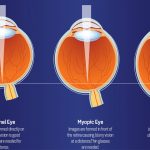Presbyopia
What is presbyopia?
What are the causes of presbyopia?
Presbyopia is caused by the natural lens becoming rigid with age. When the lens is no longer flexible, the lens doesn’t change shape to focus closer objects.
What are the symptoms of presbyopia?
-Eye strain
-Difficulty reading small prints
-Needing brighter light when doing close work
-Temporary blurred distance vision after doing close up work for long
Does it get worse with age?
Presbyopia becomes worse with increasing age. The glasses number change gradually from +1.0 Diopter to +2.5 Diopter over time for close range vision.
Rarely when people develop a cataract in older age, near vision improves due to the refractive effect of the cataract, but the distance vision becomes blurred. This phenomenon is called second sight.
Can we stop presbyopia?
No. Currently there is no method to stop or reverse this normal ageing process of the eye.
What are the treatment options for presbyopia?
The treatment includes
- Eyeglasses or contact lenses
- New Eye drops
- Refractive lens exchange (RLE)
What type of glasses are used to correct presbyopia?
- Simple reading glasses, if the person has no distance glasses.
- If a person already wears glasses for distance before age 40, once presbyopia sets in, they will usually choose from either progressive or bifocal glasses. Progressive lenses have multiple zones of focus (distance, intermediate and near) which blend into one another gradually without a clear visible line separating these zones. Bifocal glasses -as the name implies- have only two focal points: distance and near. There is a visible line between the two zones of the lens and the transition is abrupt.
Can presbyopia lead to blindness?
No. Presbyopia causes blurry near vision, which is easily correctable with glasses.

